 Petzlover
Petzlover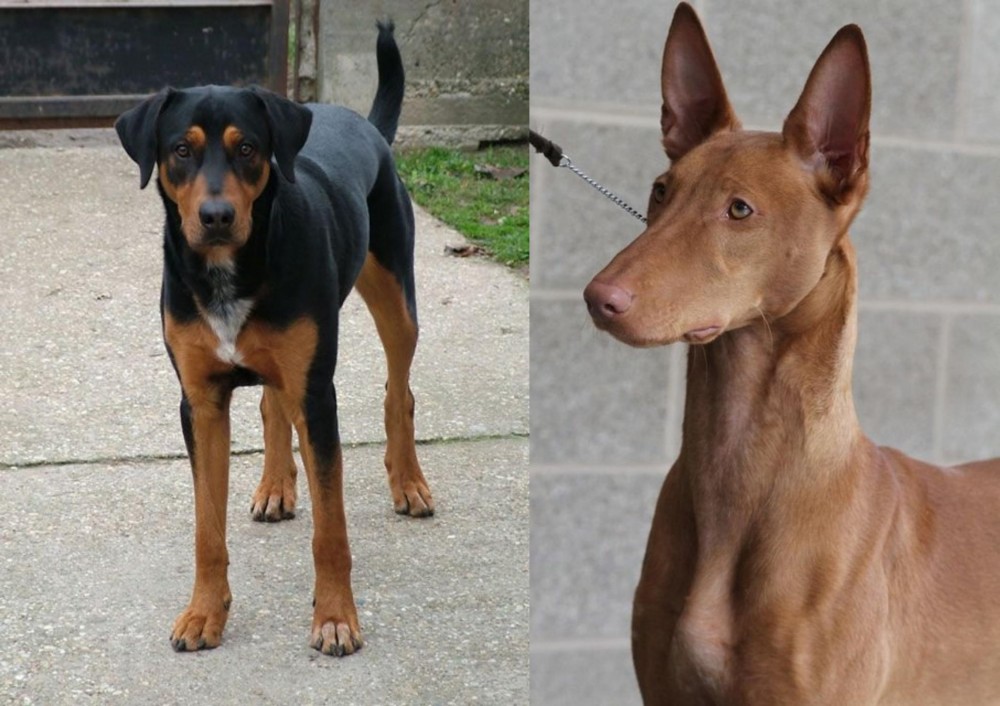 Hungarian Hound is originated from Hungary but Pharaoh Hound is originated from Malta. Both Hungarian Hound and Pharaoh Hound are having almost same height. Both Hungarian Hound and Pharaoh Hound are of same weight. Both Hungarian Hound and Pharaoh Hound has almost same life span. Both Hungarian Hound and Pharaoh Hound has same litter size. Both Hungarian Hound and Pharaoh Hound requires Low Maintenance.
Hungarian Hound is originated from Hungary but Pharaoh Hound is originated from Malta. Both Hungarian Hound and Pharaoh Hound are having almost same height. Both Hungarian Hound and Pharaoh Hound are of same weight. Both Hungarian Hound and Pharaoh Hound has almost same life span. Both Hungarian Hound and Pharaoh Hound has same litter size. Both Hungarian Hound and Pharaoh Hound requires Low Maintenance.
 The Hungarian Hound, also known as the Transylvanian Hound, originated in ancient Hungary as a hunting dog. At the time there were Asian Hounds that traveled with Hungarian Magyar tribes into Transylvania. As early as the 9th century it is believed that these Hungarian dogs were crossed with Celtic Hounds and local dogs. The result is the Hungarian Hound. These dogs were incredibly popular throughout Transylvania.
The Hungarian Hound, also known as the Transylvanian Hound, originated in ancient Hungary as a hunting dog. At the time there were Asian Hounds that traveled with Hungarian Magyar tribes into Transylvania. As early as the 9th century it is believed that these Hungarian dogs were crossed with Celtic Hounds and local dogs. The result is the Hungarian Hound. These dogs were incredibly popular throughout Transylvania.
This scent hound almost became extinct but was saved by intense breeding during the latter part of the 21st century. They developed two kinds, short and tall, for different types of hunting. The tall dogs hunted boar, bison, lynx and bear. The short dogs hunted hare, fox and chamois.
Only the tall dogs exist today. Some Hungarians raided parts of Europe and took the dogs with them. There was then a crossing breeding with Polish dogs. The tall dogs exist today in Hungary and Romania. The Hungarian Kennel Club recognized the breed and the United Kennel Club (UKC) from the United States recognizes them. No major clubs such as the AKC (American Kennel Club) or the British Clubs. The breed was accepted into the AKC Foundation Stock Service Program
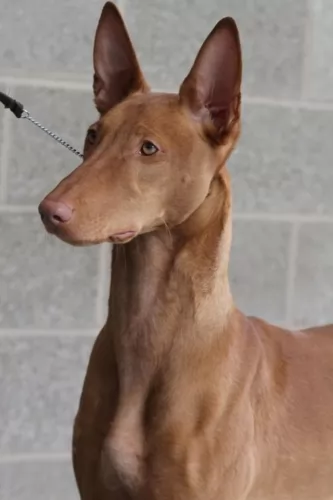 The Pharaoh Hound hails from Malta and is the national dog there. These dogs are rare and are looked upon as endangered. Because they are a primitive type dog, they enjoy good health.
The Pharaoh Hound hails from Malta and is the national dog there. These dogs are rare and are looked upon as endangered. Because they are a primitive type dog, they enjoy good health.
It has always been used as a hunting dog for rabbits. The dog has been recreated from mixing a combination of other breeds. It certainly seems to be an ancient dog breed, having existed for more than 2 000 years.
It is thought that the dog was imported to Malta by Phoenician traders. The dog has been classified as a member of the sighthound group, and arrived in England in the 1930s and to the USA in 1967. The breed was also officially recognized by the American Kennel Club in 1984.
 The Hungarian Hound is a medium sized dog, a scent hound with the same characteristics of the type of hunting hounds found in Mid-Europe. The breed is a hardy one with a long head slightly domed skull. The muzzle is short, and the jaws are strong. The lips are black, and the ears are round and hang. Their eyes are shaped like almonds and dark brown. The breed has large paws with cushioned pads and strong toes.
The Hungarian Hound is a medium sized dog, a scent hound with the same characteristics of the type of hunting hounds found in Mid-Europe. The breed is a hardy one with a long head slightly domed skull. The muzzle is short, and the jaws are strong. The lips are black, and the ears are round and hang. Their eyes are shaped like almonds and dark brown. The breed has large paws with cushioned pads and strong toes.
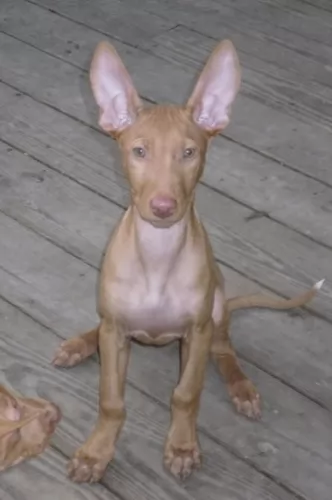 The Pharoah Hound is an elegant looking dog standing at roughly between 53 and 63cm and weighing 18 to 27kg.
The Pharoah Hound is an elegant looking dog standing at roughly between 53 and 63cm and weighing 18 to 27kg.
They are sleek dogs without any bulkiness about them and the coat is tight fitting with short smooth hair. The coat is a tan or red color, the eyes bright and the color of amber. The ears are fairly large and erect and the long tail slim with sometimes a white tip. The skin can be thin so the dog can be sensitive to the cold.
The neck of the dog is long and lean, as are the legs. An interesting aspect with this dog is that when the dog becomes excited its ears and nose become bright pink.
Pharoah Hounds are calm dogs and they can live in the city or in the countryside. They love kids and will be a wonderful playmate for them. Once he has had a lot of exercise and play, he is the kind of dog that will settle down happily with his human family for some quiet time.
Just as with any other dog, he will require training and socialization to make him obedient and better behaved.
 Children friendliness – This breed is very friendly with children.
Children friendliness – This breed is very friendly with children.
Special talents - Hunting independently and at a distance from the hunter.
Adaptability – Not an apartment dog. They need space and land.
Learning ability – They are very independent and intelligent.
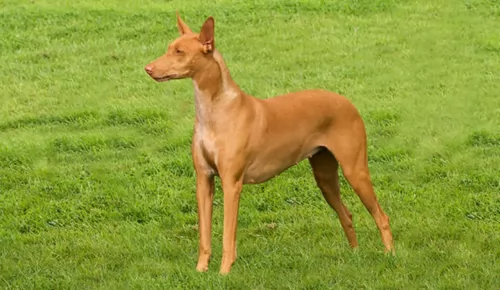 The Pharaoh Hound is quite interesting in a number of ways and he is independent, strong-willed and able to entertain and amuse himself.
The Pharaoh Hound is quite interesting in a number of ways and he is independent, strong-willed and able to entertain and amuse himself.
He loves to join in with the children and be part of their games. He’s intelligent and easily trained and he is also low maintenance.
While he’s not the most attractive dog to many people, others look at him as a true beauty. Whatever your opinion is, he will still make you a good family friend.
 Even though this is an ancient breed they do face certain medical issues such as:
Even though this is an ancient breed they do face certain medical issues such as:
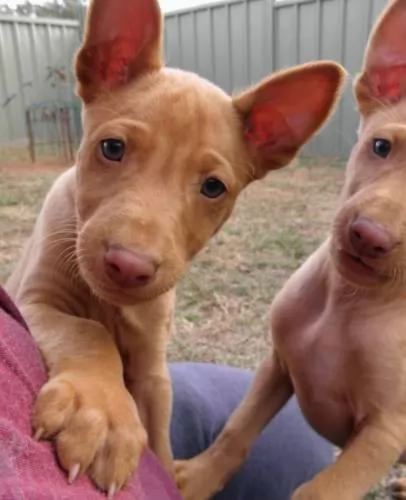 Pharaoh Hounds are uncommon outside of the Maltese Islands and with very little irresponsible breeding, these dogs are virtually free of genetic diseases. A common dog illness to look out for includes -
Pharaoh Hounds are uncommon outside of the Maltese Islands and with very little irresponsible breeding, these dogs are virtually free of genetic diseases. A common dog illness to look out for includes -
Your Pharaoh Hound can suffer from patella luxation, and in more severe cases it can be painful and even be disabling for a dog. This ailment comes about when the kneecap is dislocated from its normal position. You’ll find your dog lifting his hind leg quite a bit. Unfortunately this problem can lead to arthritis developing.
Other illnesses to look out for are bloat, cancer, skin allergies and ear infections.
 Feeding the puppy – 1-3 cups of high quality food served in 3-5 meals per day.
Feeding the puppy – 1-3 cups of high quality food served in 3-5 meals per day.
Feeding the adult – 3-5 cups of high quality food served in 2-3 meals a day.
Points for Good Health – generally healthy
Games and Exercises – The Hungarian Hound is a hunting dog and therefore accustomed to and bred for a high level of exercise. Their instinct for hunting is really strong so make sure you do not let them off leash outside of a contained area. They excel at tracking, field trials, lure chasing, and fly ball.
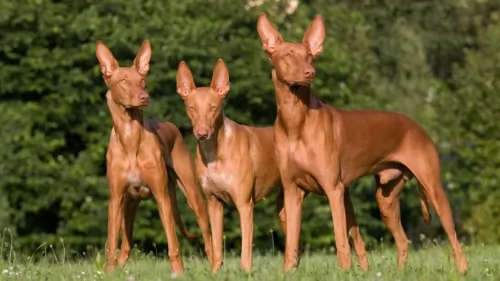 The Pharaoh Hound’s short coat is easy to groom and it will require a brushing at least twice a week just to get rid of loose hairs.
The Pharaoh Hound’s short coat is easy to groom and it will require a brushing at least twice a week just to get rid of loose hairs.
At the same time trim his nails, check inside his ears for infection and look inside his mouth for any rotting teeth.
Your Pharaoh Hound is an active, energetic dog and he will need a good dose of exercise every day. Take him with you on your walks or allow him to join you with your hikes, jogging or cycling. At home involve him in some ball games.
How much any adult dog eats will depend on a number of factors such as size of dog, age and his activity levels.
You get some excellent dog kibble these days on the market but the idea is to choose one of the high quality ones which have minerals and vitamins in them. Home-made food is also good for your pet and this should be kept simple, consistent and nutritious.
Every now and then you can add in some boiled chicken, brown rice or pasta and sweet potato, carrots and spinach to the kibble. Some raw meat added in can also be of benefit to your dog’s health.
Stay away from spicy, exotic foods and keep your dog's food easy like suggested so as to avoid digestive problems